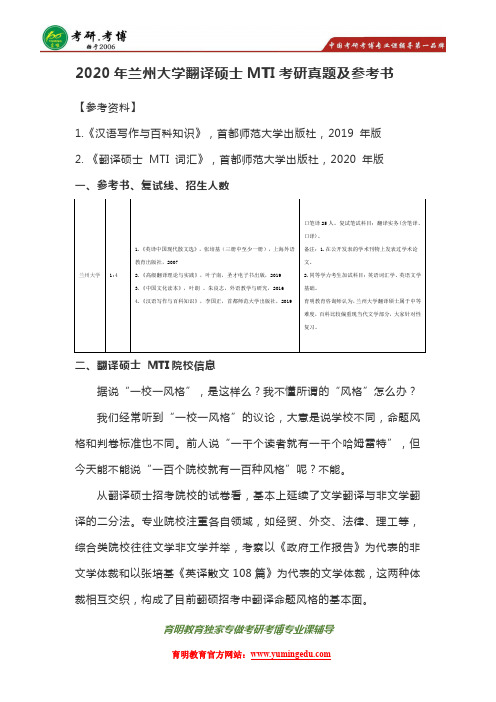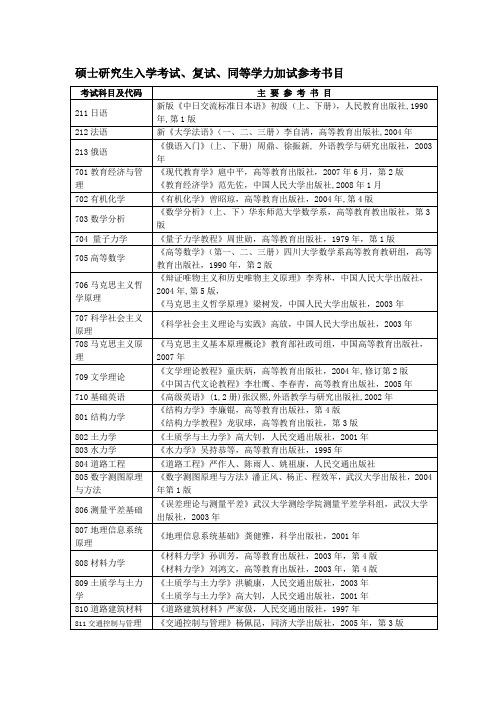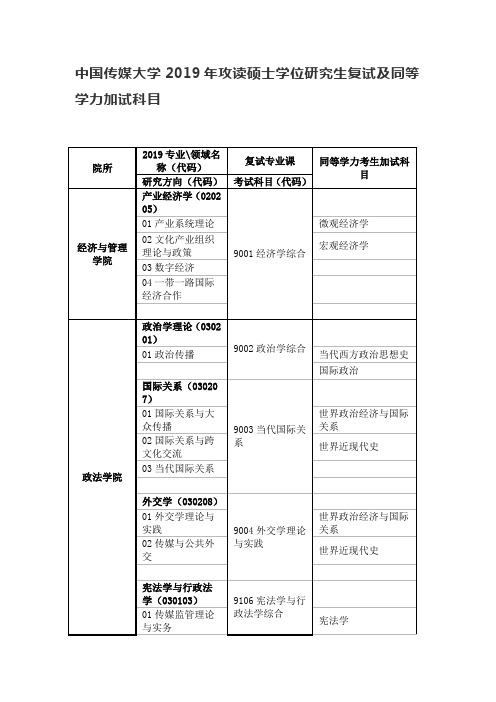同等学力考生加试科目专业英语
2020年兰州大学翻译硕士MTI考研真题备考讲解及初试参考书

2020年兰州大学翻译硕士MTI考研真题及参考书【参考资料】1.《汉语写作与百科知识》,首都师范大学出版社,2019 年版2.《翻译硕士MTI 词汇》,首都师范大学出版社,2020 年版一、参考书、复试线、招生人数兰州大学1:4 1.《英译中国现代散文选》,张培基(三册中至少一册),上海外语教育出版社,20072.《高级翻译理论与实践》,叶子南,圣才电子书出版,20193.《中国文化读本》,叶朗、朱良志,外语教学与研究,20164.《汉语写作与百科知识》,李国正,首都师范大学出版社,2019口笔译25人。
复试笔试科目:翻译实务(含笔译、口译)。
备注:1.在公开发表的学术刊物上发表过学术论文。
2.同等学力考生加试科目:英语词汇学、英语文学基础。
育明教育咨询师认为,兰州大学翻译硕士属于中等难度,百科比较偏重现当代文学部分,大家针对性复习。
二、翻译硕士MTI院校信息据说“一校一风格”,是这样么?我不懂所谓的“风格”怎么办?我们经常听到“一校一风格”的议论,大意是说学校不同,命题风格和判卷标准也不同。
前人说“一千个读者就有一千个哈姆雷特”,但今天能不能说“一百个院校就有一百种风格”呢?不能。
从翻译硕士招考院校的试卷看,基本上延续了文学翻译与非文学翻译的二分法。
专业院校注重各自领域,如经贸、外交、法律、理工等,综合类院校往往文学非文学并举,考察以《政府工作报告》为代表的非文学体裁和以张培基《英译散文108篇》为代表的文学体裁,这两种体裁相互交织,构成了目前翻硕招考中翻译命题风格的基本面。
育明教育独家专做考研考博专业课辅导翻译风格是一个常讲常新的问题,但讲得越多不一定讲得越好、越清楚。
一个译者选用何种文体,如文言、现代汉语、诗词等翻译是风格问题,选择何种词汇、结构,如大词难句、小词简单句等翻译也是风格问题,甚至这位译者喜欢用什么词,偏好什么结构也是风格问题。
因此,“风格”是一个较难定义的概念,通常是从文体、词汇(含词频)、结构等角度加以阐释。
同等学力考生加试科目代码及名称

515
水文地质学
516
基础工程学
农业水土工程
(082802)
501
水利水能规划
三选一,不得与初试科目相同
517
农田水利学(含节水灌溉技术)
522
水泵及水泵站
机械设计及理论
(080203)
520
内燃机学
二选一,不得与初试科目相同
521
机械设计
流体机械及工程
(080704)
567
2011年硕士研究生入学考试复试阶段参考书目及
同等学力考生加试科目代码及名称
(一)学术型研究生各专业复试科目代码及名称
专业名称及代码
复试科目代码
复试科目名称
备注
水文学及水资源
(081501)
501
水利水能规划
三选一,不得与初试科目相同
502
水资源系统分析
515
水文地质学
水力学及河流动力学
(081502)
528
弹性力学
《弹性力学简明教程》,徐芝纶,高等教育出版社
529
建筑设计
《建筑设计研究》、《绿色建筑》、《建筑高技术研究》、《中外建筑大师作品集》
530
技术经济学
《技术经济学概论》,吴添祖主编,高等教育出版社1998
531
管理信息系统
《管理信息系统》,黄梯云等,高等教育出版社
533
数学物理方程
《数学物理方程》,刘法贵等编,黄河水利出版社
534
概率论与数理统计(一)
《概率论与数理统计》,陈希孺,中国科技大学出版社
535
实变函数与泛函分析
《实变函数与泛函分析》,程其襄,高等教育出版社
硕士研究生入学考试、复试、同等学力加试参考书目

《现代管理理论与方法》周三多,复旦大学出版社,1995年
817工程经济
《工程经济》黄愈祥,同济大学出版社,1994年
818机械设计
《机械设计》濮良贵,高等教育出版社,2001年,第7版
819机械控制工程基础
《控制工程基础》左建民,机械工业出版社2001年
820汽车理论基础
《汽车理论》余志生,机械工业出版社,2000年,第3版
502专业综合
《工程测量学》张正禄,武汉大学出版社,2005年
《GPS测量原理及应用》徐绍铨等,武汉大学出版社,2004年
503路基路面工程
《路基路面工程》邓学钧,人民交通出版社,2005年
《公路沥青路面设计规范》(JTG D50-2006),人民交通出版社
《公路水泥混凝土路面设计规范》(JTG D40-2002),人民交通出版社
复试科目
主要参考书目
529产业经济学
《产业经济学》苏东水,高等教育出版社,2000年
530统计学
《统计学原理》黄良文,中国统计出版社,2000年
531专业综合
《管理信息系统》薛华成,清华大学出版社,2003年
《物流管理》刘刚,中国人民大学出版社,2005年
532专业综合
《中级财务管理》宋献中,东北财经大学出版社,2002年
《计算机控制技术》于海生,机械工业出版社
522专业综合
《计算机控制技术》于海生,机械工业出版社
《模拟电子技术基础》童诗白,高等教育出版社,第3版
《数字电子技术基础》阎石,高等教育出版社,第5版
523锅炉原理
《锅炉原理》叶江明,中国电力出版社,2004年,第1版
524换热器原理
《换热器原理与设计》余建祖,北京航空航天大学出版社,2006年,第1版
宁夏大学2020年硕士研究生入学复试及同等学力加试科目

《中国民族史纲要》罗贤佑编,中国社会科学出版社,2009年版。
笔试
面试
回族研究院会议室
民族社会学
中国民族理论与政策、《中国民族理论新编》,中央民族大学出版社,2006年,吴仕民主编
中国民族志,《中国民族志》中央民族大学出版社,2011年,杨圣敏主编
参考书目:2019年度注册会计师全国统一考试辅导教材—财务管理
出版社:中国财政经济出版社
作者:中国注册会计师协会
管理会计、审计学
1、管理会计(100分)
参考教材:《管理会计学》(第四版),孙茂竹主编,中国人民大学出版社
2、审计学(100分)
参考教材:《审计学》(第7版),秦荣生、卢春泉主编,中国人民大学出版社
2、《中国特色社会主义理论与实践》,高等教育出版,本书编写组,首席专家:顾海良。
3、《思想政治教育学原理》(2018年版),高等教育出版,首席专家:郑永廷,刘书林,沈壮海主编。
4、《德育原理》,北京师范大学出版社,檀传宝著
加试科目:
1、思想道德修养与法律基础
2、毛泽东思想和中国特色社会主义理论体系概论
参考书目:
1、《思想道德修养与法律基础》,高等教育出版社(2018年修订版)
2、《毛泽东思想和中国特色社会主义理论体系概论》,高等教育出版社(2018年修订版)
学科教学(思政)
复试科目:
专业理论课:
1、中国特色社会主义理论与实践(含思想政治教育学原理、德育原理)
2、教育综合
参考书目:
1、《中国特色社会主义理论与实践》,高等教育出版,本书编写组,首席专家:顾海良。
工商管理(专硕)
2016年研究生招生复试及同等学力加试科目

动力工程
1、暖通空调
2.、锅炉原理
1、《暖通空调》(第二版)陆亚俊等编中国建筑工业出版社
2、《电厂锅炉原理》(第三版)丁立新主编中国电力出版社
1、空调用制冷技术
2、通风工程
《空气调节用制冷技术》(第四版)彦启森等编中国建筑工业出版社、《工业通风》(第四版)孙一坚等编中国建筑工业出版社
1、汽轮机原理2、热力发电厂
《电厂汽轮机原理及系统》(第三版)靳智平主编中国电力出版社、《热力发电厂》(第四版)叶涛主编中国电力出版社
009
建筑工程学院
081401
岩土工程
1、土力学与基础工程
或
2、混凝土结构设计原理
1、《土力学地基基础》,陈希哲主编,清华大学出版社
2、《混凝土结构设计原理》,东南大学、天津大学、同济大学合编,中国建筑工业出版社
2、不指定教材
008
能源与环境学院
081404
供热、供燃气、通风及空调工程
暖通空调
《暖通空调》(第二版)陆亚俊等编中国建筑工业出版社
1、空调用制冷技术
《空气调节用制冷技术》(第四版)彦启森等编中国建筑工业出版社
2、通风工程
《工业通风》(第四版)孙一坚等编中国建筑工业出版社
081403
市政工程
水污染控制工程
6《棉织原理》黄故主编中国纺织出版社7《织物结构与设计》顾平东华大学出版社
8《织物结构与设计》荆妙蕾中国纺织出版社
1、纺纱学
2、织造学
3、纺织材料学
4、纺织品设计学
1、同入学考试
2、①《织造学》朱苏康主编中国纺织出版社②《棉织原理》黄故主编中国纺织出版社
3、同入学考试
4、①《织物结构与设计》顾平东华大学出版社②《织物结构与设计》荆妙蕾中国纺织出版社
同等学力申硕英语单词

同等学力申硕英语单词英文回答:The equivalence principle for Master's degree examination requires a certain level of English proficiency. Candidates aiming to pursue a Master's degree through equivalence must demonstrate their English abilities by meeting established benchmarks.The specific requirements vary depending on the institution and the program of study. However, there are some general guidelines that are commonly followed. Typically, candidates are expected to possess a working knowledge of English grammar and vocabulary. They should be able to read, write, and speak English effectively.In addition to general English proficiency, candidates may also be required to demonstrate their skills inspecific areas. For example, those planning to pursue a Master's degree in a technical field may be required tohave strong technical English skills. Similarly, those planning to pursue a Master's degree in a humanities field may be required to have strong academic English skills.The equivalence principle for Master's degree examination ensures that all candidates have the necessary English skills to succeed in their studies. By meeting the established benchmarks, candidates can demonstrate their ability to participate effectively in academic discussions, read and comprehend course materials, and communicate their ideas clearly.中文回答:同等学力申硕英语单词要求。
中国传媒大学2019年攻读硕士学位研究生复试及同等学力加试科目

新闻写作
传播研究院
传媒教育(0503Z7)
9028教育学
01传媒高等教育
心理学
新闻业务
播音主持艺术学院
语言传播(0503Z8)
9049播音主持理论与实践
01语言传播理论
播音学概论
02语言传播应用
艺术概论
03口语传播
艺术研究院
艺术史论(1301Z1)
9038艺术作品评论
01艺术美学
艺术概论
数字信号处理
信息与通信工程学院
电路与系统(080902)
9063数字电路
01现代电子设计
通信原理
EDA(含实验)
电磁场与微波技术(080904)
9064电磁场与微波技术
01 5G天线与微波技术
通信原理
02光纤通信技术
数字信号处理
03电磁兼容
通信与信息系统(081001)
信息与通信工程学院
01声频技术
03(电影学)影视制片
广播电视艺术学(1303L2)
电视学院
01电视艺术理论
01方向9032广播电视学与媒介前沿
01方向电视节目分析、电视编辑基础
戏剧影视学院
02电视策划
02方向9044电视作品分析
02、03、04、05方向文艺理论、文学写作
03广播电视文艺
03方向9045电视文艺作品分析
04电视剧理论与实践
01动画理论与实践
动画概论
02动画产业
动画原理
数字媒体艺术(1305Z2)
9056数字媒体艺术理论与实践
01数字媒体理论与实践
影视艺术概论
02交互媒体设计
CG作品分析
互动艺术与技术(1305Z3)
同等学力加试科目参考书目

同等学力加试科目参考书目近年来,随着社会的发展和竞争的加剧,学历已经成为许多求职者的硬性要求。
而在学历上,同等学力考试成为许多人提升学历的一种途径。
同等学力考试需要参加加试科目的考试,而选择适合的参考书目就显得尤为重要。
本文将为您介绍一些同等学力加试科目的参考书目,供您参考选择。
一、英语同等学力加试科目的英语部分主要涉及词汇、语法、阅读理解、写作等方面。
以下是一些适合同等学力考试英语科目的参考书目:1. 《大学英语四级考试真题与解析》:该书收录了多年的英语四级考试真题,并提供详细的答案解析,适合用于提高英语语法和词汇的理解能力。
2. 《剑桥雅思真题精选》:该书选取了多个历年的雅思考试真题,并提供了答案和解析,适合用于提高英语听力、阅读和写作的能力。
3. 《新东方TOEFL词汇考点精选》:该书系统地总结了TOEFL考试中的重点词汇,并提供了多种记忆方法和练习题,适合用于扩大英语词汇量。
二、数学同等学力加试科目的数学部分主要涉及数学分析、线性代数、概率论等方面。
以下是一些适合同等学力考试数学科目的参考书目:1. 《高等数学》(第六版):该书是数学学科的经典教材,内容涵盖了数学分析的基础知识,适合用于系统学习数学分析的概念和方法。
2. 《线性代数及其应用》(第四版):该书介绍了线性代数的基本理论和应用,重点介绍了线性方程组、矩阵和向量空间等内容,适合用于学习和理解线性代数的概念和运算方法。
3. 《概率论与数理统计》(第四版):该书详细介绍了概率论和数理统计的基础知识和理论方法,适合用于学习和掌握概率论和数理统计的概念和计算方法。
三、法律同等学力加试科目的法律部分主要涉及宪法、行政法、民法、刑法等方面。
以下是一些适合同等学力考试法律科目的参考书目:1. 《宪法》(2018年修订版):该书详细介绍了我国的宪法体系和基本原理,适合用于学习和理解宪法的基本内容和法律体系。
2. 《行政法》(第六版):该书介绍了行政法的基本原理和法律制度,重点介绍了行政行为、行政机关和行政诉讼等内容,适合用于学习和理解行政法的基本概念和制度。
- 1、下载文档前请自行甄别文档内容的完整性,平台不提供额外的编辑、内容补充、找答案等附加服务。
- 2、"仅部分预览"的文档,不可在线预览部分如存在完整性等问题,可反馈申请退款(可完整预览的文档不适用该条件!)。
- 3、如文档侵犯您的权益,请联系客服反馈,我们会尽快为您处理(人工客服工作时间:9:00-18:30)。
湖南师范大学硕士研究生入学考试自命题考试大纲考试科目代码:[加试] 考试科目名称:专业英语一、考试形式与试卷结构1)试卷成绩及考试时间本试卷满分为100分,考试时间为180分钟。
2)答题方式答题方式为闭卷、笔试。
3)试卷内容结构各部分内容所占分值为:Tourism overview 约20分How tourism is organized 约20分Understanding travel behavior 约20分Tourism supply,demand,policy,planning and development 约20分Essentials of tourism research and marketing 约20分4)题型结构阅读理解题:15小题,每小题2分,共30分名词解释题:4小题,每小题3分,共12分英译汉:4小题,每小题6分,共24分简答题:3小题,每小题6分,共18分论述题:2小题,每小题8分,共16分二、考试内容与考试要求考试目标:1、考察考生的英语综合运用能力。
2、了解学生的旅游专业知识如旅游的基本原理、旅游业组织架构、旅游者行为、旅游供应规划与政策和发展,旅游研究和市场营销的基本方法等。
3、测试学生运用旅游学基本理论和地理人文思想分析和解决旅游业现实问题的能力。
考试内容:一、Tourism in Perspective(一)Understand what tourism is and its many definitions.(二)Learn the components of tourism and tourism management.(三)Examine the various approaches to studying tourism and determine which is of greatest interest to you.(四)Appreciate how important this industry is to the economy of the world and of many countries.(五)Know the benefits and costs of tourism.二、Hospitality and Related Service(一)Study the lodging industry, its ancient origins, its associations, names of leading companies, and its vital role in the economy.(二)Appreciate the immensity of the restaurant food service industry.(三)Learn the current trends in resorts and timesharing modes of operation.(四)Discover why meetings and conventions, as well as meeting planners, are so important to tourism.三、Organizations in the Distribution Process(一)Become familiar with tourism distribution system organizations and their functions.(二)Understand the role of travel agents and their dominance in the distribution system.(三)Consider the growing impact of the Internet on the distributionsystem.(四)Examine the role of the tour wholesaler.(五)Recognize that travel suppliers can use a combination of all channels of distribution.四、Attractions,Entertainment, Recreation and Other(一) Examine the attractions sphere.(二)Look at the role of theme parks.(三)Understand the gaming industry.(四)Describe public and commercial recreation facilities.(五)Recognize shopping as a travel attraction.五、Motivation for Pleasure Travel(一) Adopt a professional approach to motivation and recognizedifferences in other people’s motives.(二)Appreciate the range of ideas on travel motivation, including historical accounts and psychological theories.(三)Be aware of contemporary research practices in tourism that integrate motive and destination feature assessments.(四)Be familiar with conceptual approaches to tourist motivation and recognize that there is continual development and enhancement ofideas in this field.六、Cultural and International Tourism for Life’s Enrichment(一)Recognize that travel experiences are the best way to learn about other cultures.(二)Identify the cultural factors in tourism.(三)Appreciate the rewards of participation in life - seeing tourism.(四)Become aware of the most effective promotional measures involving an area ’ s cultural resources.(五)Realize the importance of cultural attractions to any area promoting itself as a tourist destination.(六)Evaluate the contributions that international tourism can make toward world peace.七、Sociology of Tourism(一) Appreciate the inordinate social impact that travel experiences make onthe individual, the family or group, and society as a whole — especially the host society.(二)Recognize that a country ’ s indigenous population may resent the presence of visitors, especially in large numbers. Also recognize that the influence of these visitors may be considered detrimental, both socially and economically.(三)Discover that travel patterns change with changing life characteristics and social class.(四)Become familiar with the concept of social tourism and its importance in various countries.八、Tourism Components and Supply(一)Know the four major supply components that any tourism area must possess.(二)Become familiar with the newer forms of accommodations: condominium apartments and timesharing arrangements.(三)Be able to use the mathematical formula to calculation the number of guest rooms needed for estimated future demand.(四)Develop the ability to perform a task analysis in order to match supply.(五)Discover methods of adjusting supply component in accordance with fluctuating demand levels.九、Tourism Policy:Structure,Content and Process(一)Demonstrate the critical importance of tourism policy to the competitiveness and sustainability of a tourism destination.(二)Outline the structure and content of a typical policy framework for a tourism destination.(三)Describe a process for the formulation of a destination tourism policy.十、Tourism Planning,Development and Social Consideration(一)Identify the factors that determine the success of a tourism destination.(二)Relate tourism planning to tourism policy.(三)Discover what the goals of tourism development should be.(四)Recognize that some serious barriers to tourism development must be overcome if a desired growth is to occur.(五)Learn the political and economic aspects of development, including those related to developing countries.(六)Appreciate the importance of architectural design and concern for heritage preservation, local handicrafts, and use of indigenous materialsin creating tourist facilities.十一、Tourism and Environment(一)Recognize the worldwide important of natural resource conservation and sustainable tourism development.(二)Learn how ecotourism can benefit local people.(三)Understand the dangers and limitations of ecotourism.(四)Understand tourist codes of ethics and guidelines.(五)Learn current environmental practices of tourism organizations and suppliers.(六)Learn how to maintain natural destinations.十二、Travel and Tourism Research(一)Recognize the role and scope of travel research.(二)Learn the travel research process.(三)Study secondary data and how they can be used.(四)Understand the methods of collecting primary data.(五)Know who does travel research.十三、Tourism Marketing(一)Become familiar with the marketing mix and be able to formulate the best mix for a particular travel product.(二)Appreciate the importance of the relationship between the marketing concept and product planning and development.(三)Understand the vital relationship between pricing and marketing.(四)Know about distribution systems and how this marketing principle can best be applied to a variety of travel products.(五)Be able to do market segmentation to plan a marketing program for the business you are the most interested in.(六)Demonstrate the linkage between tourism policy and tourism marketing.三、主要参考书Ratchie(eds)Tourism:Principles, Practices and Philosophies. John Wiley &Sons , Inc., Hoboken, New Jersey ,10th editionSharpley,R.(1999)Tourism, Tourists and Society. Elm Publications, Huntingdon. 2nd edition。
